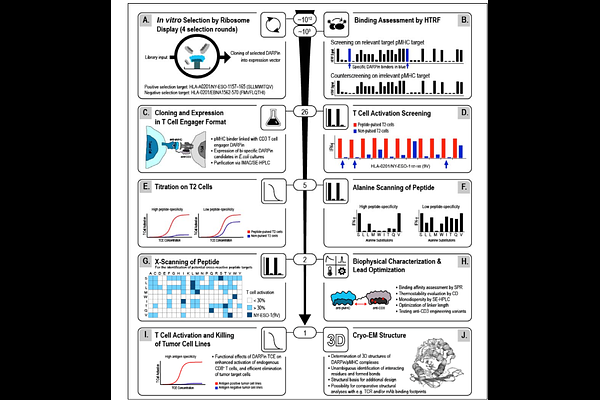Development of DARPin T cell engagers for specific targeting of tumor-associated HLA/peptide complexes

Development of DARPin T cell engagers for specific targeting of tumor-associated HLA/peptide complexes
Venetz-Arenas, N.; Schulte, T.; Müller, S.; Wallden, K.; Fischer, S.; Resink, T.; Kadri, N.; Paladino, M.; Pina, N.; Radom, F.; Villemagne, D.; Bruckmaier, S.; Cornelius, A.; Hospodarsch, T.; Alici, E.; Ljunggren, H.-G.; Chambers, B. J.; Han, X.; Sun, R.; Carroni, M.; Levitsky, V.; Sandalova, T.; Walser, M.; Achour, A.
AbstractThe compromise between affinity and specificity in TCR-dependent targeting of HLA-restricted tumor-associated antigens presents a significant challenge in developing efficacious immunotherapies. As such, T cell engagers which circumvent these limitations are of particular interest. We have established a process to generate bispecific Designed Ankyrin Repeat Proteins (DARPins) that simultaneously target HLA-I molecules in complex with tumor-associated peptides and CD3{epsilon}. High-affinity HLA-A*0201/NY-ESO1157-165-specific DARPins were isolated after only four rounds of in-vitro selection from naïve DARPin libraries. Combining HLA-A*0201/NY-ESO1157-165-specific DARPins with a CD3{epsilon}-specific DARPin created potent T cell engagers which elicited CD8+ T cell activation towards tumor targets with high peptide specificity, as confirmed by X-scanning mutagenesis and functional killing assays. The cryo-EM structure of a ternary DARPin/HLA-A*0201/NY-ESO1157-165 complex revealed a rigid and concave DARPin surface that binds to the entire length of the peptide-binding cleft, contacting both -helices and the peptide. The present results unveil promising immuno-oncotherapeutic approaches with the possibility of rapidly developing DARPins with high affinity and specificity to HLA/peptide targets that can be readily combined with a new generation of anti-CD3{epsilon}-specific DARPins.